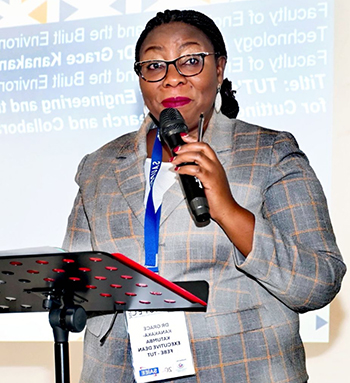by Kgaugelo Selane
The Tshwane University of Technology’s Faculty of Engineering and the Built Environment recently had the honour to host one of the most significant events in the field of power engineering. The 33rd Southern African Universities Power Engineering Conference (SAUPEC 2025), saw a convergence of academics, professionals and students, all united in their mission to share innovative ideas, and push the boundaries of research in power engineering.
Organised in collaboration with the South African Institute of Electrical Engineers (SAIEE) and the Institute of Electrical and Electronics Engineers (IEEE) South Africa Section, SAUPEC provided a vital platform for promoting collaboration across sectors. It was a space where academia, industry and policymakers could engage in discussions that addressed everything from renewable energy solutions to the impact of the Fourth Industrial Revolution (4IR) on the future of power systems.
In her welcome address, Dr Vathiswa Papu-Zamxaka, TUT’s Deputy Vice-Chancellor for Research, Innovation and Engagement, underlined the importance of collective action in advancing research and innovation within the power engineering field. She emphasised that industries and governments must work together for sustainable and innovative energy solutions to be realised at Southern Africa universities. She also highlighted the crucial role of TUT in advancing research that supports national and global energy goals.
The conference featured high-level discussions with a number of the foremost experts in power engineering. Prof Ozoemena Ani, a leading figure in Mechatronics and Agricultural Machinery at the University of Nigeria, Nsukka, delivered a thought-provoking keynote on the role of electric vehicles in mitigating climate change. According to Prof Ani transportation contributes to 15 to20% of global CO2 emissions, with road transport being responsible for the largest share. He argued that the development of electric vehicles could play a critical role in reducing emissions, improving energy efficiency and lessening dependence on fossil fuels. Drawing from his university’s partnership with industries focused on electric vehicle technologies, he highlighted how collaboration between universities, industries and governments could turn innovative ideas into practical solutions that create jobs and drive infrastructure development in Africa.

Dr Grace Kanakana-Katumba, the Executive Dean
of the Faculty of Engineering and the Built
Environment, speaking at SAUPEC, highlighting the
role of collaboration and innovation at TUT.
The emphasis on collaboration was echoed by Dr Grace Kanakana-Katumba, Executive Dean, Faculty of Engineering and the Built Environment (FEBE). She spoke passionately about the role FEBE plays in advancing cutting-edge research and ensuring that students are equipped to lead in a rapidly changing world.

Dr Vathiswa Papu-Zamxaka, Deputy Vice Chancellor for Research, Innovation and Engagement.
With more than 10 000 students, the Faculty is a powerhouse of innovation. Dr Kanakana-Katumba stressed the importance of patience and long-term vision in shaping the future. She reiterated that the Faculty’s focus would continue to be on empowering students and engaging with the broader community to promote an environment of knowledge and collaboration.
The conference also celebrated the achievements of TUT’s students. One of the highlights was the recognition of Hillary Idoko, a doctoral student at TUT’s Department of Electrical Engineering who was awarded the SAIEE Rotating Machines Section prize for the best paper. Idoko’s paper, co-authored with Dr UB Akuru and Prof O Popoola explored the complexities of different winding configurations for double stator wound field flux switching motors. In an emotional moment, Idoko expressed his gratitude for the award, calling it an affirmation of the hard work done at TUT in the field of Electrical Engineering.
TUT’s role in shaping the future of power engineering was further emphasised by Dr Akuru, who served as the General Chair for SAUPEC 2025.
He described the conference as a critical bridge between academia and industry, offering a unique opportunity to encourage collaboration and knowledge exchange. Dr Akuru remarked that the event was more than just an academic gathering, it was an essential platform for preparing the next generation of electrical engineers to face the challenges and opportunities in the power engineering landscape.

Delegates at the 33rd Southern African Universities Power Engineering Conference
engaging in discussions on advancing sustainable energy solutions for the future.
